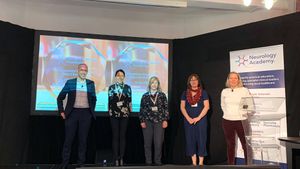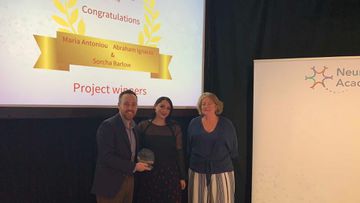Navigating MS Through The World of Social Media: Steering Away From Dr. Google
Poster
Introduction:
Multiple Sclerosis (MS) is the most common condition of the central nervous system affecting young adults, with diagnosis primarily occurring within the 20-30 age bracket. Yet despite the young age of onset, we continue to educate and provide initial support on MS through archaic methods. Diagnosis is often followed with a bundle of pharmaceutical specific literature on disease modifying therapies, full of technological jargon. 1
As we now find ourselves in the era of Millennial’s & Generation Z, advanced technology and increased use of social media has a huge part to play in the education and support of those newly diagnosed with MS. As healthcare professionals, we have a significant role to play in supporting the productive use of social media and in supporting the navigation of this disease through valid online resources. 2
Through the development and use of a valid social media resource tool, we can empower patients’ in their understanding and management of this disease through reputable and valid online outlets and encourage a move away from the unreliability, misinformation and subsequent fears associated with a ‘Dr. Google’ search. 3-4
Objectives:
The main objectives of this project were:
- To develop a social media directed resource tool for those newly diagnosed with Multiple Sclerosis (MS) (See Figure 1)
- To minimise and subsequently discourage the use of a ‘Google Search’ on MS
- To support MS Clinical Nurse Specialists in providing suitable and appropriate links to social media networks and resources
Service Development:
- The Multiple Sclerosis Network of Clinical Nurse Specialists within the Republic of Ireland had previously identified a gap within their service delivery: a need to provide suitable and appropriate links to social media networks and support systems for their patient cohort
- The resource tool was sent to the MS Nurse Network for evaluation & feedback from a healthcare professional perspective
- The resource tool was simultaneously sent to a focus group of 12 people with established diagnoses of MS, for their evaluation and feedback from a patient perspective
- A presentation to the MS Consultants within University Hospital Galway will take place for approval to provide this information sheet at clinic to those newly diagnosed with MS
- A meeting with MS Ireland’s Research & Advocacy Officer will take place to discuss the sharing of other organisations social media channels via their platform
- A focus group will be arranged for 12 months post initial diagnosis and provision of the social media resource leaflet, to gather patient feedback.
Figure 1: Social Media Resource Leaflet:

Results:
- Feedback from the MS Nurse Specialist Network identified a clear need for such a resource in the initial management, education and support of those newly diagnosed
- More than half of the MS Nurse Network had never heard of at least one of the social media supports identified in the leaflet
- The feedback from the MS Focus Group also supported the development of and use of such a resource
- 6 out of the 12 people involved in the focus group stated that they only became aware of some of the outlined social media resources through this project and have since engaged with these outlets and found them of great benefit from an information and social support perspective
- All participants involved in the focus group engaged in Google searches on initial diagnosis, with all participants identifying the negative impact with which same had on their acceptance and management of the illness
- All participants wished that such a resource had been available at their time of diagnosis and stated that it would have supported their acceptance and learning and facilitated social engagement and increased interaction opportunities with others living with MS
- Results of the consultant presentation, the meeting with MS Ireland and the post diagnosis focus group are outstanding and will be reported in due course when completed
Conclusions:
It is undeniable that the internet is now a much valued and important source of information for those diagnosed with MS and continues throughout their disease trajectory. As healthcare professionals, within our remit of education and advocacy, we must ensure that the right outlets and social media channels are being promoted.
The use of this resource tool, makes navigating the world of MS more accessible for everyone – for those diagnosed, for their families, caregivers and friends and also for healthcare professionals.
Diagnosis can often be a lonely experience. Supporting the use of online outlets facilitates increased social support, interaction with others and sharing of lived experiences. Research to date has supported the use of social media in patient empowerment, a reduction in depression and increased engagement.
The use of such a resource will undoubtedly improve patient outcomes, support the management and education of patients and effectively adapt to the needs of an illness evolving within the digital era.
References:
- Basirat, A., Shahraki, H.R., Farpour, H. & Habibi,L. (2020). The Correlation between Using Social Networks and the General Health of Multiple Sclerosis Patients. Multiple Sclerosis International, 1-7, https://doi.org/10.1155/2020/2791317
- Eijkholt, M. & Sparling, A. (2019). Health, honesty and happiness: Aithenticity and anonymity in social media participation of individuals with multiple sclerosis. Multiple Sclerosis and Related Disorders, 27, 121-126.
- Kantor, D., Bright, J.R. & Burtchell, J. (2018). Perspectives from the Patient and the Healthcare Professional in Multiple Sclerosis: Social Media and Participatory Medicine. Neurology & Therapy, 7, 37-49.
- Farpour, H.R., Hoveidaei, A.H., Habibi, L., Moosavi, M. & Farpour, S. (2020). The impact of social media use on depression in multiple sclerosis patients. Neurologica Belgica, https://doi.org/101007/s13760-020-01407-1

More MS Academy Digital health solutions Projects

Encouraging excellence, developing leaders, inspiring change
MS Academy was established in 2016 and in that time has accomplished a huge amount with exciting feedback demonstrating delegates feel inspired and energised along their personal and service development journeys. The various different levels of specialist MS training we offer are dedicated to case-based learning and practical application of cutting edge research.
